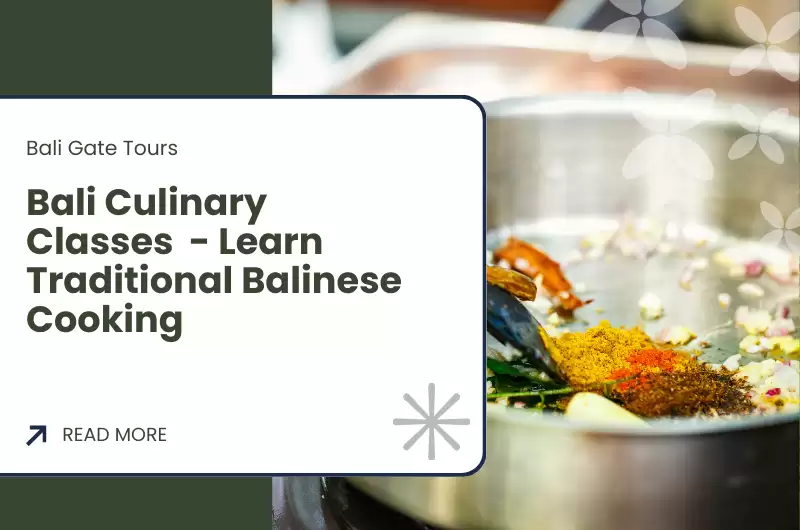Bali Culinary Classes - Learn Traditional Balinese Cooking

Bali is not just a paradise of golden beaches and lush rice terraces; it’s also a haven for food enthusiasts eager to dive deep into the island’s rich culinary traditions. Bali culinary classes provide travelers with a unique opportunity to engage with the culture on a sensory level, learning to prepare authentic Balinese dishes while discovering local markets, spices, and techniques that have been perfected over generations. For many, these classes are more than just cooking—they are a cultural immersion, a way to taste Bali with all senses engaged.
The journey typically begins at a traditional Balinese market, a vibrant hub brimming with colors, aromas, and sounds. Here, students of the cooking class are introduced to essential ingredients like fresh herbs, exotic spices, and tropical vegetables. Understanding these components is critical, as Balinese cuisine relies heavily on a balance of flavors—spicy, sweet, sour, and umami. Market tours also allow travelers to witness daily life, observe local vendors at work, and learn the stories behind the ingredients, which are deeply intertwined with Bali’s culture and traditions.
Once the ingredients are selected, the culinary adventure moves to the cooking venue, often set in a traditional Balinese kitchen or a serene villa garden. Under the guidance of experienced chefs or local hosts, participants learn step-by-step how to prepare classic dishes such as nasi goreng (fried rice), sate lilit (minced seafood satay), lawar (spiced meat and vegetable salad), and bebek betutu (slow-cooked duck). These recipes are more than mere meals—they are expressions of Balinese heritage, passed down through families for generations.
Hands-on experience is at the heart of these classes. Travelers are encouraged to participate in every step—from grinding spices using traditional mortars and pestles to wrapping dishes in banana leaves. This tactile engagement allows participants to connect with the food, understanding not only the techniques of Balinese cooking but also the patience and care involved in each preparation. Such immersive learning often transforms cooking from a routine task into an art form that celebrates local culture.
Beyond the cooking itself, many Bali culinary classes include lessons on presentation and dining etiquette. Balinese cuisine is as much about aesthetics as it is about flavor; dishes are often beautifully arranged with colorful garnishes and carefully folded banana leaves. Travelers learn to appreciate the visual artistry, understanding that each dish tells a story, whether it’s meant for daily meals, temple offerings, or festive occasions. This aspect of the class deepens cultural understanding, highlighting the symbolism and rituals embedded in Balinese food.
Sharing a meal prepared during the class is often a highlight. Sitting down with fellow participants, students get to taste their creations alongside traditional accompaniments like sambal (spicy chili paste), krupuk (crispy crackers), and urap (coconut and vegetable salad). This communal experience reinforces the social and celebratory nature of Balinese dining, where food brings people together, bridging cultures and creating lasting memories.
Many culinary tours also offer the chance to explore farm-to-table experiences, visiting local gardens, spice plantations, or even rice paddies. Learning about where ingredients come from, from the soil to the plate, provides a deeper appreciation for the freshness and sustainability inherent in Balinese cooking. Participants often gain insights into traditional farming practices, the use of natural fertilizers, and the careful cultivation of herbs and spices—practices that have preserved both flavor and ecological balance for centuries.
Culinary classes in Bali cater to all skill levels. Beginners can start with simple dishes and gain confidence, while seasoned cooks may explore more intricate recipes and advanced techniques. The classes are often highly personalized, allowing travelers to ask questions, experiment, and adapt recipes, making the experience both educational and creatively fulfilling. Learning in such an intimate setting often fosters connections—not just with the food, but with the people and the culture itself.
One of the most memorable aspects of a Balinese cooking experience is the sensory overload—the vibrant colors of fresh produce, the fragrant aromas of spices roasting, the sizzling sounds of food being prepared, and the delightful tastes of newly mastered dishes. Each element combines to create an unforgettable culinary adventure, leaving participants with skills, stories, and recipes to bring Bali’s flavors into their own kitchens back home.
In conclusion, enrolling in Bali culinary classes for travelers is more than a cooking lesson; it’s a journey into the heart of Balinese culture, history, and daily life. From bustling markets to serene kitchens, from spice-laden hands to flavorful creations, these experiences offer a hands-on exploration of Balinese traditions that enriches every visit. Whether you’re a food lover, a culture enthusiast, or someone seeking an interactive way to connect with Bali, these classes promise an authentic, flavorful, and educational adventure that transcends a typical tour.
For travelers looking to deepen their understanding of Bali’s gastronomic heritage, these classes are highly recommended. By the end of the day, participants not only leave with delicious meals but also with a newfound respect for the intricate flavors, techniques, and cultural significance behind each dish. In this way, Bali culinary classes become a bridge between tourism and tradition, providing a meaningful, hands-on experience that remains with travelers long after they leave the island.










